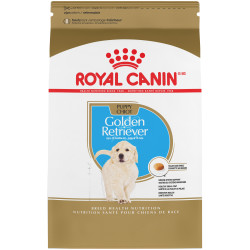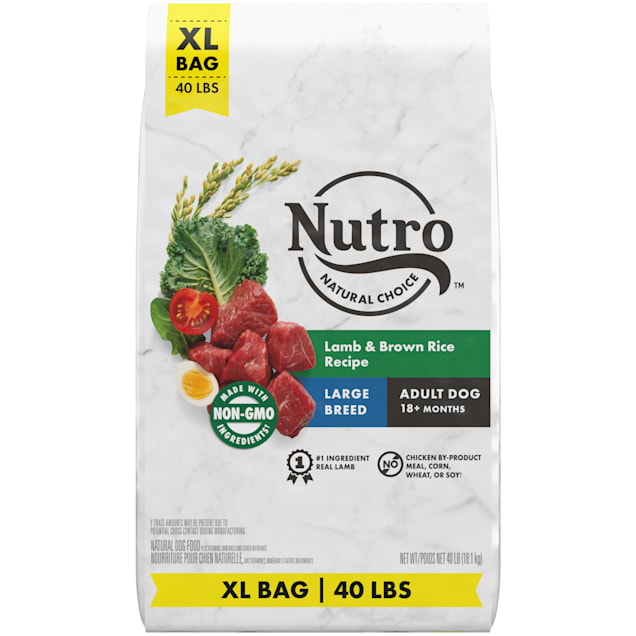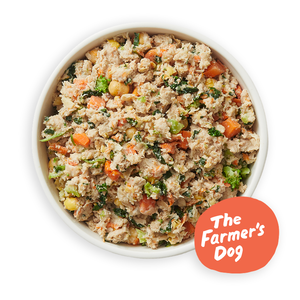What's the Best Dog Food for Golden Retrievers?
Golden Retrievers are generally a healthy, hearty breed. But poor breeding, or an unhealthy lifestyle, can exacerbate the health problems they are at risk for, like heart disease and hip dysplasia. Learn more here about the breed, and how you can do your part to fulfill the dietary and health needs of the Golden in your life.
AKC Classification: Sporting
Exercise Required: 60 minutes/day
Ideal Weight:
Healthy Male Weight: 65-75 lbs
Healthy Female Weight: 55-65 lbs
Breed Summary
Far more than just a pretty face, the Golden Retriever has many endearing qualities that have made it wildly popular. They are friendly, outgoing, adaptable, teachable people-pleasers that make for some of the best family dogs around, as well as great service dogs for the blind, for search and rescue, and for therapy. The breed was developed in Scotland in the 1800s to be a swimming, fetching, waterfowl-retrieving hunter’s companion. President Gerald Ford’s Golden Retriever, Liberty, is credited with causing the breed’s popularity to take off in the U.S., in the 1970s. According to VetStreet.com, the Golden Retriever, with its sweet, gentle, eager-to-please personality,is the best breed for first-time dog owners.
Physical Traits
Athletic, sturdy, muscular, thick coat
Personality Traits
Loyal, intelligent, loving, gentle
Health Considerations for Golden Retrievers
Like most sporting breeds, the Golden Retriever needs a lot of exercise. It was, after all, bred for lots of time in the outdoors on the move, and has a naturally athletic, muscular build. Even if you’re not a hunter and your Golden’s a city dog, the breed does need an active lifestyle that includes outdoor play. If they are not given this kind of lifestyle, it may lead to behavioral problems. So the Golden does need enough calories to support its ideally high level of activity, however this is a fine line, as the breed can be prone to obesity as well. Be careful that they don’t get an excess of their food, of treats, or of table scraps — especially those high in fat. Goldens also are at a heightened risk of cancer, heart conditions, eye problems, skin problems, and joint issues.
Cancer
More than half of all Golden Retrievers die of cancer. Osteosarcoma, lymphoma, and hemangiosarcoma are some common types. While Cancer unfortunately can't always be prevented, we recommend seeking responsible, proactive breeders who have genetics tested. From a health and nutrition standpoint, the best thing you can do to prevent some Cancers in Golden Retrievers are:
Heart Conditions
Diseases of the heart like dilated cardiomyopathy and subvalvularaortic stenosis are not uncommon with large breeds, and Golden Retrievers are no exception. A diet rich in the following could help offset the risk:
Eye Problems
Like many animals as they age, Golden Retrievers are at a risk of developing Cataracts. But throughout life, they also have a higher propensity for Progressive Retinal Atrophy (PRA), Glaucoma, distichiasis, entropion, corneal dystrophy, and retinal dysplasia. To do your best to protect your Golden Retriever’s eyes, we recommend a diet that includes:
Skin Problems
A Golden’s thick, feathery coat is one of its most attractive features. But all that hair can also create a cozy home for bacteria, and for mites and ticks to stay close to the skin and cause irritation or allergic reaction. So the foods and supplements we recommend may contain:
Joint Issues
Like most large, active breeds, Golden Retrievers run the risk of Hip or Elbow Dysplasia and Arthritis, and special attention ought to be paid to their joints. We therefore like to see their food contain:
Complete a nutritional assessment to view individualized diet recommendations specifically for your pet.
Foods We Recommend: Golden Retriever Puppies
When do Golden Retrievers grow out of the puppy stage?
15-20 months old
Golden Retrievers maintain a relatively high level of energy well into adulthood, so you can imagine what their puppy years — when these active bundles of joy are at their mostenergetic — are like, and the caloric requirements that must be met then. Here’s what we recommend:

Rocky Mountain Recipe with Red Meat Puppy Grain-Free Dry Dog Food

Golden Retriever Puppy Food

Large Breed Puppy Formula Dry Dog Food

Be Natural Puppy Real Chicken & Brown Rice Recipe Dry Dog Food
Foods We Recommend: Golden Retriever Adults
When do Golden Retrievers become adults?
15-20 months old
The foods below come with our highest commendation for your Golden Retriever’s adult years. They fulfill the nutritional needs this active sporting breed has, and come in handy for staving off some conditions they can start to be susceptible to in this life stage:

Large Breed Adult Natural, Non-GMO, Lamb & Rice

Primitive Natural Grain-Free Natural Dry Dog Food

Adult Select Chicken Recipe Dry Dog Food

Fresh, Personalized Ingredient Meal Plan
+ Custom, human-grade diet
+ More expensive than kibble
Foods We Recommend: Golden Retriever Seniors
When do Golden Retrievers become seniors?
8 years old
Not only do Golden Retrievers start to become at risk for the aforementioned health problems in their senior years, but without close attention paid to their nutrition, their thick and stocky bodies can easily put on excess pounds as their metabolism and activity levels slow down. Here’s what we recommend:

Large Breed Senior Chicken & Brown Rice

Bright Mind Adult 7+ Chicken & Rice Formula Dry Dog Food

Senior Real Chicken, Sweet Potato & Garbanzo Bean Recipe Dry Dog Food

Senior Chicken Recipe Grain-Free Dry Dog Food
Affiliate Disclosure
We do not accept money to recommend pet foods. However, we do receive referral fees from online retailers (such as Chewy or Amazon) on qualifying purchases. Our recommendations are neutral, and diet recommendations are made without considering whether we will receive a referral fee.

